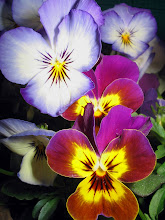
As predicted, I devoured The Miracle at Speedy Motors in a very short space of time, and to the general abandonment of such trifles as housework and childrearing. And, I hardly need add, it was every bit as entertaining and life-affirming as McCall Smith’s previous novels.
The characters are maturing wonderfully, and there is, as ever, huge enjoyment to be had from the writer’s deceptively simple and effortless style, behind which lies real insight, wisdom and humour. ‘Kindness’ is a watchword in this series, as in the Scotland Street and Isabel Dalhousie novels (indeed, this one is dedicated to McCall Smith’s wife, Elizabeth, ‘a kind doctor, a worker of miracles’.
It’s not really a book which requires reviewing or promoting here, of all places – it will do very well indeed without my adding my own two-ha’pence-worth, and I can’t think of a single one of my known readers who will not delight in it as much as I did.
It’s not really a book which requires reviewing or promoting here, of all places – it will do very well indeed without my adding my own two-ha’pence-worth, and I can’t think of a single one of my known readers who will not delight in it as much as I did.
'There were not many subjects one could not raise with an old friend. But there were some. One thing one should never do is to criticise, even in the gentlest of manners, the spouse of a friend; nor their children, nor their taste in music, their dogs, their possessions in general, their choice of clothes in particular, their children's choice of clothes (or spouses), or their cooking. Apart from that, one could talk about anything.'
However, a recent - but (in my view) misguided and let us hope short-lived – flurry of anti-McCall Smith criticism in the blogosphere has sent my riteousindignationometer right off the scale and I feel compelled to rush, avenging sword unsheathed, to the writer’s defence. Not that he is in the remotest need of my assistance, of course, but it will make me feel better to have a bit of a rant.
Susan Hill recently blogged about a friend’s taking her to task for enjoying McCall Smith’s Botswana novels: 'How can you possibly endorse this sort of racist patronising fiction about funny black men and women with daft names, places with Old Empire attitudes, poking fun at the traditional build of Botswanan women, being sentimental about Life in the Bush . . .? Don’t you feel ashamed to join this sort of looking-down-on natives which should have gone out with Queen Victoria?' To which Susan’s response was: ‘something has happened to me. My pleasure in [the Precious Ramotswe books] has been slightly soured. I feel guilty about enjoying them. I now wonder uneasily what Botswanans think about them, whether they do feel patronised and ridiculed and looked down upon, as my friends claims they surely must. But once you know a thing you can never un-know it, though you may forget it. I bet I don’t forget this though. Which is sad, don’t you think? I feel someone has stolen something from me.’
Well, I really don’t think this can go unchallenged. And it is best answered, I feel, not by me but by the author himself, in conversation with the estimable Marcel Berlins in this interview in The Guardian . In response to Berlins’ suggestion that McCall Smith does not portray ‘real life’ in Botswana, because he refers only infrequently and obliquely to the terrible scourge of Aids, the writer replies:
‘"The Botswanans themselves don't dwell on it. They just wish to continue with their ordinary lives as best they can, and as far as possible I want to respect their wishes. They don't talk about it all the time - they're obviously sensitive about it - so there's no reason why I should," he explains. Perhaps partly because of the respect and affection he has for the country, his books have been warmly welcomed locally. He has witnessed no resentment at the fact that they were written by an outsider. "I think people in Botswana are pleased that my books paint a positive picture of their lives and portray the country as being very special. They've made a great success of their country, and the people are fed up with the constant reporting of only the problems and poverty of the continent. They welcome something which puts the positive side."’
However, a recent - but (in my view) misguided and let us hope short-lived – flurry of anti-McCall Smith criticism in the blogosphere has sent my riteousindignationometer right off the scale and I feel compelled to rush, avenging sword unsheathed, to the writer’s defence. Not that he is in the remotest need of my assistance, of course, but it will make me feel better to have a bit of a rant.
Susan Hill recently blogged about a friend’s taking her to task for enjoying McCall Smith’s Botswana novels: 'How can you possibly endorse this sort of racist patronising fiction about funny black men and women with daft names, places with Old Empire attitudes, poking fun at the traditional build of Botswanan women, being sentimental about Life in the Bush . . .? Don’t you feel ashamed to join this sort of looking-down-on natives which should have gone out with Queen Victoria?' To which Susan’s response was: ‘something has happened to me. My pleasure in [the Precious Ramotswe books] has been slightly soured. I feel guilty about enjoying them. I now wonder uneasily what Botswanans think about them, whether they do feel patronised and ridiculed and looked down upon, as my friends claims they surely must. But once you know a thing you can never un-know it, though you may forget it. I bet I don’t forget this though. Which is sad, don’t you think? I feel someone has stolen something from me.’
Well, I really don’t think this can go unchallenged. And it is best answered, I feel, not by me but by the author himself, in conversation with the estimable Marcel Berlins in this interview in The Guardian . In response to Berlins’ suggestion that McCall Smith does not portray ‘real life’ in Botswana, because he refers only infrequently and obliquely to the terrible scourge of Aids, the writer replies:
‘"The Botswanans themselves don't dwell on it. They just wish to continue with their ordinary lives as best they can, and as far as possible I want to respect their wishes. They don't talk about it all the time - they're obviously sensitive about it - so there's no reason why I should," he explains. Perhaps partly because of the respect and affection he has for the country, his books have been warmly welcomed locally. He has witnessed no resentment at the fact that they were written by an outsider. "I think people in Botswana are pleased that my books paint a positive picture of their lives and portray the country as being very special. They've made a great success of their country, and the people are fed up with the constant reporting of only the problems and poverty of the continent. They welcome something which puts the positive side."’

As I’ve mentioned before, I’ve been reading McCall Smith since the late 1980s, when I would go through his chapters of Law and Medical Ethics (first published in 1983, and co-written with Kenyon Mason, though AMcS did not contribute to the current edition) with a fine-tooth comb and a red pen, and I challenge anyone to find me a writer who has thought more deeply about his subject matter or written with more insight, intelligence and humanity. His profound consideration of the ethics surrounding the end and ending of human life are a testimony to this.
As outlined on the jackets flaps of his novels, McCall Smith was born in Zimbabwe (then Rhodesia), educated in Scotland and then, from 1980, taught law at the University of Botswana, where he help set up a new law programme – having already done the same thing in Swaziland the year before. He began writing the Mma Ramotswe series in order to show the ‘small, everyday Botswana that the tourist doesn't get to see’, and he considers it perfectly ‘legitimate to write about virtue’ and to show ‘qualities that are found all over Botswana. People don't go in for distance and insincerity’. He has immersed himself in the everyday life and culture of the country for many years and is as qualified to write about its people as anyone. That he has chosen to write from the point of view of a black African woman is no more ‘patronising’ to his central character and her real-life antecedents than if he had written from the point of view of an American serial-killer, an Ancient Roman slave or a Glaswegian drug dealer. If writers were to be prevented through political over-correctness from writing about a single individual outside their own class, gender, colour or nation, then there would be no fiction.
(One of the critical blog-reviews I landed on recently had said something to the effect of: ‘I really enjoyed these books but it would have been a lot better if they’d been written by a black woman rather than a white man’ . . . )
Of course, there will be many who do not ‘get’ these books. I often don't 'get' books which others rave about. No author can be all things to all readers. But the overwhelming popularity of McCall Smith’s novels cuts across all barriers – his Botswana books in particular have an astonishingly world-wide appeal. And this is, I'm convinced, because there is truly nothing else quite like them. I can’t think of another writer whose books leave one with such a sense of life’s meaning and purpose. They are, truly, ‘life-affirming’. And not in a facile, kitschy, sugary way at all. Here are meditations on life’s universal dilemmas (albeit often the smaller-scale dilemmas, but nevertheless ones which touch us all, whether we live in a British city or an African village), written by a man who has pondered to the limits of his not inconsiderable intellect the ethics of life, death and medicine. A man, moreover, for whom kindness is a paramount human quality.
And I believe he shows a kindness towards his characters as great as any they strive to offer to each other. He is not 'poking fun' at them; their names are not 'daft' but authentic, and he doesn't hold them up for ridicule. The fact that Mma Ramotswe refers to her husband by his full name and title is no more peculiar than Jane Austen's Mrs Bennet calling her husband Mr Bennet, nor the fact that a generation ago I didn't address my parents' friends by their first names. It's simply the custom of the place and time. If it slows down the pace of the conversation, then . . . good! It serves in the novel to underline the fact that life is lived at a different speed in Gabarone, that certain formalities are observed, that a particular degree of respect is shown to others. Why is this a bad thing?
My own (pretty finely-tuned) political correctness early warning system detects no bigotry or underlying imperialist racism in McCall Smith’s writing. They have never set off any alarm bells here. I believe he is far too sensitive and wise, as a human being, as a writer, and as a lawyer, not to have scrutinised his own motives and the likely impact of his somewhat unlikely heroine on his readers in Botswana as much as in the UK. And I’ve yet to read any criticism which argues the case against him more cogently than setting out the simple equation: White Middle Class Scottish Male writes with wry humour about Black African Women = intrinsically racist and patronising QED. See those knees jerking!
OK, rant over. All comments welcome – especially from citizens of Botswana, disgruntled or otherwise.
NB – for fans of AMcS – his attractive website now has an audiovisual ‘news’ page amongst other delights, and also click here for a full illustrated list of his vast but less well-known output of children’s books.





















1 comment:
Only just got to read this, J. Brilliant! Hear, hear! You have identified the essence of his writing and his attitude to the people and values of Botswana. Let those who imagine fault look to their own attitudes!
Post a Comment